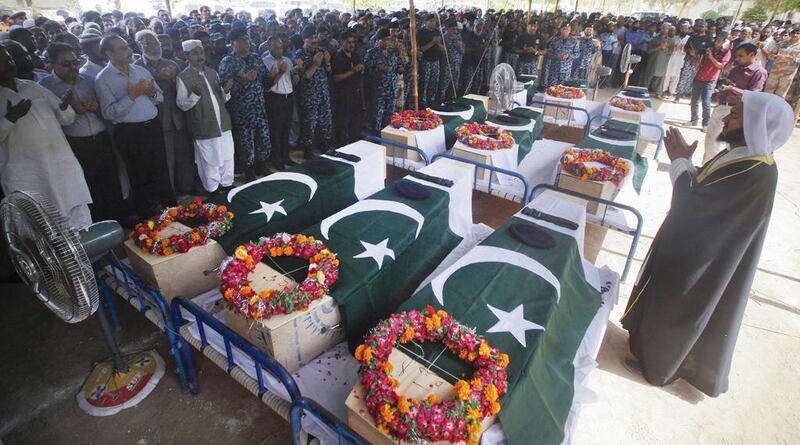Taimur Khan and Raza Khan
KARACHI // Mohammad Yousuf was sitting with fellow airport security officers on Sunday night, taking a break from work, when the routine at Jinnah International’s quiet cargo and VIP terminal descended into a nightmare.
“We heard huge explosions and gunshots at the Fokker Gate side of the terminal,” the sergeant, a 19-year-veteran of the federal Airport Security Force (ASF), said from a hospital bed yesterday, his white sheets blotched with blood.
He was among the lucky.
Almost immediately, the men received frantic radio calls from their colleagues stationed near the hangars requesting backup. They readied their weapons and rushed out, some running, others jumping into a patrol jeep.
Mr Yousuf, commanding officer of the ASF’s QR-2 squad, said he was handing helmets to his squad members when he saw a young man, dressed in an ASF uniform, run towards them firing. Confused, Mr Yousuf, 42, said he shot back, but the hesitation was costly.
A bullet pierced the right side of his stomach. He fell, injured but conscious, and said he shouted to his men who had taken cover that the terrorists were wearing ASF uniforms. That’s when he saw one of the squad members, a man named Hafeez, lying dead next to him.
Five more militants approached, firing from both his left and right side, and Mr Yousuf said he returned fire. “I called out to my colleagues that I had been injured, but no one could come near,” he recalled, the ceiling fan over his bed at Jinnah Medical Centre barely stirring the humid afternoon air.
His men fought off the Taliban attackers, who he said were all wearing yellow flak jackets over suicide vests. In the end, 11 ASF men, along with a policeman, a paramilitary Rangers officer and six Pakistan International Airlines (PIA) workers lay dead. 10 militants were killed.
Faiz Muhammad, 30, an ASF officer who also lay in a bed at Jinnah Medical, was hit by a bullet in his left thigh. He described a similar scene, saying that he and his comrades were confused by the militants’ uniforms, but eventually saw that they all wore trainers rather than their heavy standard-issue boots.
“They also had dried fruits, dates, medicine and water,” Mr Muhammad said. Local news reported the militants had anticoagulant pills that would allow them to fight on after being injured.
“They had rocket launchers and were at some 200 yards from my position,” Mr Muhammad said. “I had my own sub-machine-gun but when one of my fellows was martyred I took his G-3 rifle and started firing at the terrorists who were hiding behind the cargo. They were hurling hand grenades as well.”
It is clear that the militants had prepared for a long siege, and a TTP spokesman confirmed that they were aiming to hijack an aircraft. Before Pakistani troops and commandos arrived, the ASF were the first line of defence, and their quick actions helped prevent the operation from becoming a catastrophe, and the potential capture of a full Emirates Airline flight that was stranded on a runway during the fighting.
At Jinnah Hospital, the city’s largest government-run medical centre, the bodies of nine of the known attackers lay on white marble slabs in the hot morgue.
“Nine bodies can be easily identified from their faces. However, one was damaged but intact. Some of their body parts, including hands, are missing,” senior police official Raja Umer Khittab said while briefing the media on Monday.
The night before, amid the sickly sweet smell of burnt flesh, blood and explosives, the bodies lay in the darkened morgue, with officials using lights on their mobile phones to inspect the corpses due to an electricity blackout.
“This one is suspicious,” said policeman Sayed Salman, gesturing to a body wearing the black T-shirt and blue camouflage trousers of the ASF.
Most of the right side of his abdomen was missing due to an explosion, and he wore a long beard and carried a blank PIA identification card.
The dead militants were young men in their twenties, Mr Khittab said, adding that their features suggest they may be Uzbek.
tkhan@thenational.ae





